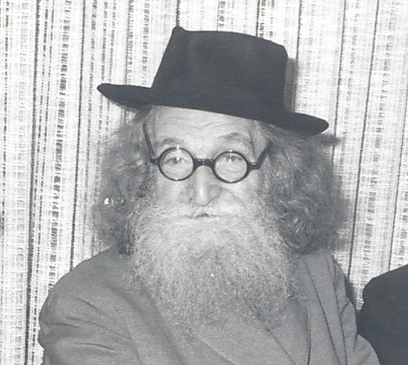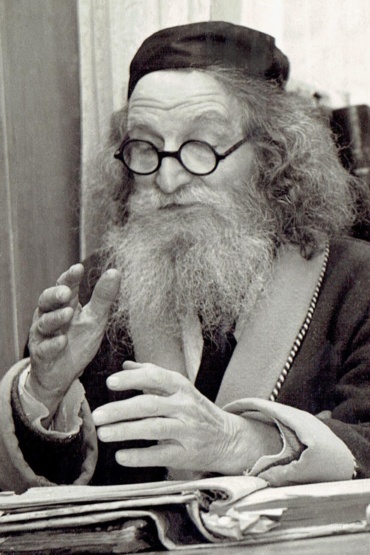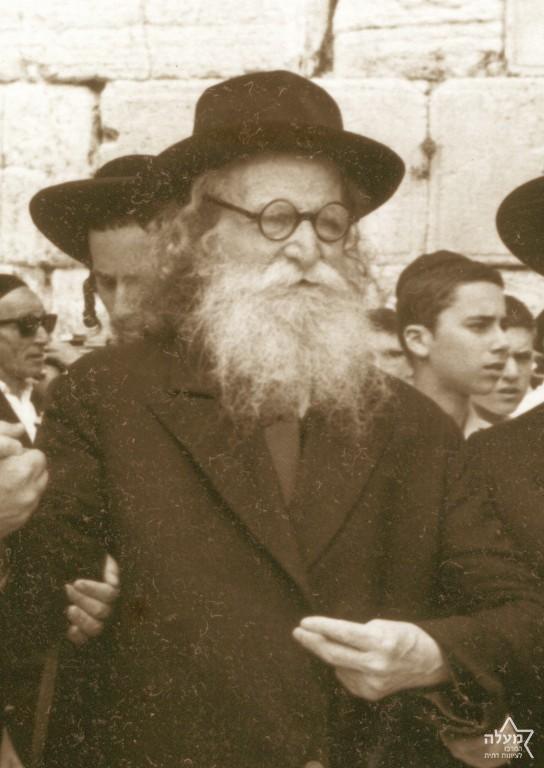The Life of the Nazir of God Rabbi David Cohen zt“l
Rabbi David Cohen, renowned as “The Nazirite Rabbi” (Harav HaNazir), was distinguished in learning Torah, serving Hashem, and wisdom. He was one of the leading disciples of Rabbi Abraham Issac Kook, after meeting and becoming closely attached to him in Switzerland. He followed his teacher to Israel where he thirstily imbibed his Rebbe’s Torah teachings and edited his magnus opus “Orot Hakodesh”.
Rabbi David Cohen was a unique and astounding person – highly talented and with steel determination. He knew no compromises, but aspired for absolute truth, and the highest, deepest and most hidden comprehension, and he was ready to give up his whole being for this. He was an expert in both the wisdom of Kabbalah and in general philosophy. He yearned for spiritual fulfillment, yet was a scholar, a meticulous researcher, and even worked on comparing versions and translations in the most precise way. His strong desire to attain a high spiritual level, that would allow him spiritual enlightenment and a sense of prophecy, brought him to walk in desolate and distant places. His appearance was wondrous; long golden Nazirite hair and tall stature, all declared nobility and spirituality.
Source: Yeshivat Mercaz Harav website


Engagement and General Education
The Meeting Between Rabbi Kook and the Nazir
His expanding horizons and encounter with general academic literature opened new paths in the personality of the Nazir, but it did not satisfy the thirst in is heart, which sought to delve into the secret teachings and hidden dimension in the world of Jewish wisdom. Nevertheless, dealing with non-traditional philosophy books that are not found with the regular texts on the bookshelf of a typical yeshiva student, must surely have paved the way for an extremely important meeting at St. Gallen in Switzerland between Rabbi Kook and Rabbi David Cohen on the eve of Rosh Chodesh Elul 5675 (1915).
In his personal recollections, the Nazir described the dramatic course of this meeting: “Twenty-seven years ago, while I was in Switzerland in Basel, engaged in philosophical studies from different periods, full of thirst and yearning for truth, especially Jewish truth, I heard a rumor that the Rav was staying in the eastern part of the country. I wrote him a letter and upon receiving his reply, decided to go to him. I stayed with him overnight … I could not sleep that night, for my life hung in the balance. Early the next morning I heard footsteps pacing here and there, the morning blessings, the akeidah recital, … Following the morning prayers, I hurried to write down that I had found more than which I had prayed for—I had found a Rebbe.”
In practical terms, the meeting influenced both his spiritual world and his geographical location. “A new period in my life began, I became a different person,” Rabbi David Cohen later wrote in his memoirs.
During their stay in Switzerland, Rabbi David managed to study with Rav Kook, to ask questions and to hear shiurim. However, a year later, Rav Kook was called to serve as a rabbi in London, after making a condition with his community that when it was possible to return to the Land of Israel, his commitment to them would cease and he could return immediately to Israel. Indeed, two years later World War I ended, and Rav Kook returned to Israel and was appointed rabbi of Jerusalem.
In the meantime, Rabbi David remained in Switzerland, full of longing to be close to his Rebbe. On Rosh Hashanah 5682 (1921), the Nazir Rav was informed that he had received a visa to enter Palestine, and on the eve of Yom Kippur, ten days later, he arrived at the city of Jaffa, planning to join the staff at the “Yeshiva Hamerkazit” under the spiritual guidance of Rav Kook.
Concerning his reunion with the Rav in Israel, he wrote in his memoirs: “I went to the Warshavsky Hotel. Right away I intended to go to the house of the Rav, who had been the joy of my life and my spiritual life-force for several years. How fortunate I am, to be privileged to ascend to this holy place, for he (meaning the Rav) is the soul in our breath, anointed by God. How fortunate I am, to be privileged to see him sitting in the highest and most elevated place over the Jewish nation (as the rabbi of Jerusalem). And you, Israel, are fortunate to have merited such a shepherd …”
Two and a half years later, his fiancée received an entry visa and together they established their home in the Holy Land.

His Distinct Conduct
During those years, Rabbi David lived at the back of Rav Kook’s beit midrash, where he slept and ate, and continued to study day and night. He was an ascetic and fasted frequently, and often undertook “speech fasts”. For example, he used to remain silent from the beginning of Elul until the end of Yom Kippur. From the beginning to the end of Yom Kippur, he remained standing in the synagogue, immersed in prayer and Torah.
His spiritual aspirations were miraculous and wondrous. On Shabbat he kept silent, in order to absorb the hidden elevated emanations. Out of extreme sensitivity to animal cruelty, he refrained from eating meat. Out of a desire to sanctify himself, he accepted the Nazirite vow, did not drink wine or cut his hair.
He was an expert in both the wisdom of Kabbalah and in general philosophy. He yearned for spiritual fulfillment, yet was a scholar and a meticulous researcher, and even worked on comparing versions and translations in the most precise way. His strong desire to attain a high spiritual level, that would allow him spiritual enlightenment and a sense of prophecy, brought him to walk in desolate and distant places. His appearance was wondrous; long golden Nazirite hair and tall stature, all declared nobility and spirituality.

The Nazir Writes about Rav Kook
I am here sitting in the heart of Israel, in the heart of Jerusalem the Holy City, in the home of the leading Rabbi of our generation. He is the central point of all Jewish wisdom, he encompasses and includes everything. His heart is filled with gentle, deep, and sharp emotions and his soul is full of goodness and lovingkindness. His intellect is full of sharpness, brilliance and knowledge. He is a genius, a researcher, a tzaddik, a perfect person, a Hassid, humble and proud like Hillel. And more than the calf – the student – wants (to learn) – the rabbi wants (to teach) …” (Nezir Echav p. 283).
Another piece of his writing: “We are in the times of Mashiach, the redemption has begun… no-one realizes, no-one knows. It is as if everyone has a mask over their eyes, they are behind a screen and don’t know or understand what is in front of them. Only the Rav, our spiritual leader, is the soul of the revival – he knows, and he sees. When I went up to him after Shabbat to congratulate him on his appointment to the Chief Rabbinate, we exchanged very few words, but there were revelations, like a bolt of lightning. And the house shone from a prophetic revelation, as at a time of redemption.” (ibid. p. 288).
God’s hand is upon him and His spirit is within him. He needs a servant, and I am that servant with my whole heart…” (ibid. p. 392).

